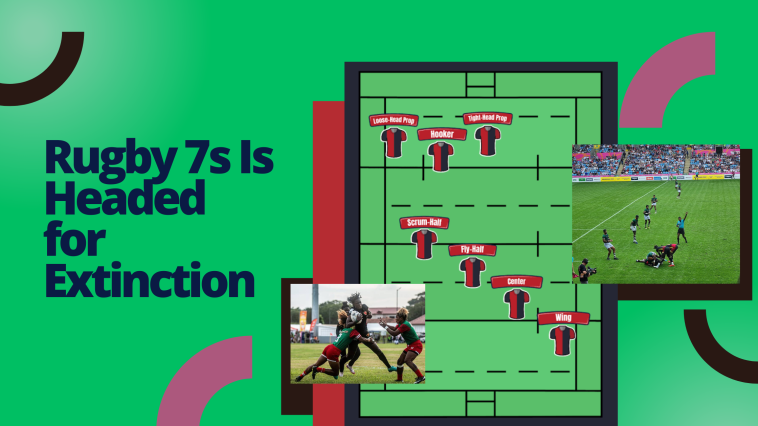It’s a strange thing, this feeling of watching something you once believed in, something you were told was the future, just…fade away. Remember when they sold us rugby sevens? It was going to be the shiny, new thing. Fast, exciting, and Olympic! A sport for television, a sport for sponsors. They were selling the code purely for capitalism. While 15s was about heritage, sevens was about growth, they said. But today, if you look closely, you can see the truth. This isn’t just a stumble. It’s the slow funeral procession of the code.
Look at our home, Uganda, and you’ll see a microcosm of this decay. Our URU scrambling to invite makeshift sides to fill out sevens events isn’t showing inclusivity; it’s showcasing a structural breakdown. This chronic reliance on “invitational” sides isn’t an act of grace; it’s a symptom of a shallow talent pool and a broken pipeline. We’re not cultivating depth; we’re just masking an absence with improvisation. The result isn’t competitive rugby. It’s simply weekend entertainment disguised as development.
These invitational teams lack tactical depth, long-term goals, or any real investment in player growth. They’re just here to plug holes in a fixture list, not to build the future of the sport. For our boys and girls, it means fewer chances to test themselves against real quality. For the fans, it’s a watered down spectacle. For sponsors, it’s a poor, poor investment. The health of Ugandan sevens isn’t just questionable; it is visibly on life support.
But our struggles aren’t unique. They’re part of a bigger, sadder story. You’ve heard it, too, haven’t you? Ireland has already shut down its men’s sevens program, saying it’s just not practical financially. Great Britain, too, scrapped its full time contracts, reducing its sevens setup to a part time arrangement. All over the world, unions are scaling back. It’s not because they hate the code, but because it simply doesn’t pay its own way.
World Rugby’s decision to shrink the core teams from 12 to 8 for the SVNS restructure only made things worse, accelerating the decline. The fewer the core teams, the smaller the ladder for ambitious nations like ours. It makes the climb for emerging unions seem almost impossible, while our own domestic programs starve for funding. Here in Uganda, we see the knockon effect all too clearly. Without steady investment, our domestic leagues become shells of their former selves. With every tournament padded by ad hoc teams, the gap between our local scene and international standards grows wider and wider. And when that gap widens, our dreams of the Challenger Series or the SVNS divisions fade into pure fantasy.
This isn’t just about bad luck. This is systemic. Our local unions face brutal funding gaps. They just don’t have the resources to keep a competitive squad together year round. Instead of investing in the grassroots, what we see is a simple instinct for survival: patch the calendar, borrow credibility from invited teams, and just hope that the public doesn’t notice the emptiness underneath. But of course, we notice. The players see the stagnation. The fans see the disorganization. And the sponsors, well, unlike the players and the fans, they don’t stick around out of loyalty. They simply move on.
Once upon a time, Kenya was the very heart of sevens. They were flamboyant, powerful, and total giant-slayers on the World Series circuit. Their win over New Zealand in the 2016 Singapore Sevens was hailed as a watershed moment. And yet, look at them now. They’ve been reduced to fighting for their place in the Challenger Series. Financial instability, administrative infighting, and a complete lack of investment in their development structures have dragged down what was once Africa’s proudest sevens program. Their players have openly complained of not being paid, strikes have interrupted their preparations, and promising young athletes have drifted to athletics or football just to find some stability. The decline of Kenya isn’t just a local tragedy; it’s a terrifying omen of what happens when sevens ceases to be sustainable.
And even South Africa’s Blitzboks, one of the most successful sevens sides in history, have suffered under the SVNS restructuring. They’ve dominated circuits and won series titles, but with fewer events and reduced opportunities for depth players, their program’s role as a development pipeline has shrunk. Younger South African athletes now see more certainty in 15s, with its Super Rugby and international tests, than in the increasingly fragile sevens circuit. The Blitzboks will stay competitive at the elite level, no doubt, but the code’s role in developing players is clearly diminishing. What was once a launchpad is being reduced to a mere cameo stage.
Even in Fiji, the spiritual home of sevens, where the code is a religion, the sport isn’t immune to these global contractions. They continue to field exceptional players, but their financial sustainability is fragile. The Fiji sevens team is bankrolled by government support, community fundraising, and international sponsorships. With the global game shrinking, those lifelines are at risk. The danger is that Fiji becomes the beautiful, magical exception that just proves the rule, increasingly isolated in a sevens world where most unions are downgrading their programs.
When wealthy unions like Ireland and Great Britain cut programs, everyone else should shudder. If unions in resource rich Europe decide that sevens isn’t financially viable, what chance do we have here in Africa, Asia, or Latin America? What happens in Dublin and London today is a sign of what will happen in Kampala and Nairobi tomorrow. These aren’t just isolated budget trims. They are loud signals that the code can no longer justify its existence in the current commercial world.
The new SVNS model is meant to be a pathway, from regional competitions to the World Series, but it demands consistent, high level competition. Domestic leagues that rely on invitational teams simply don’t have the intensity needed to prepare our sides for international levels. That competitive disconnect just widens the gap between our local and global standards. Uganda’s filler-team competitions, Kenya’s financial woes, and Britain’s cuts all speak to the same truth: there is no longer a coherent bridge between the grassroots and the elite circuit. The Olympic illusion, too, is starting to crack. Sevens secured its Olympic status by promising diversity and global participation, but what happens when domestic leagues collapse, unions cut programs, and the World Series becomes an exclusive party for only eight teams? The Olympic argument falls apart. If the IOC decides that sevens no longer represents a truly global sport, its spot is in danger. Losing that would be a devastating blow to rugby as a whole, sending us back into the shadows of a niche sport.
Sponsors don’t invest in uncertainty. A league where teams are just cobbled together for show, or a union cutting programs because of cost, is just not sponsor-friendly. Brands want consistency and credibility. Sevens is offering neither. Uganda’s patchwork tournaments, Kenya’s unpaid players, and Britain’s casual approach are not attractive packages for corporate investment. The money is leaving, and with it, the very sustainability of the code.
The writing is on the wall, and it’s clear: rugby union is consolidating around 15s. That’s where the tradition, the commercial power, and the global loyalty reside. Sevens will survive, but only as a carnival: a bit of Olympic glitter, a weekend festival, a useful tool for 15s players to stay fit. It will no longer be a professional pathway for most unions. Our filler sides here in Uganda, Kenya’s strikes, South Africa’s reduced development role, Fiji’s fragile funding, Britain’s cuts, and Ireland’s outright retreat are not random stories. They are chapters in a single, painful book: the global collapse of professional rugby sevens.
Sevens won’t disappear completely. It will still light up Dubai, Hong Kong, and Cape Town. The Fiji faithful will still dance in the stadium aisles. But the professional backbone of the code is being hollowed out. The grassroots that fed the spectacle are slowly dying. The pathways are closing. The obituary is already being written. Rugby union will march on, but it will be the 15s game carrying the flag, while sevens lingers as a bright, fun, nostalgic, but no longer essential, cousin. The last ruck for sevens is already underway. When the final whistle blows, don’t say we weren’t warned. Uganda, Kenya, Ireland, and Great Britain have already shown us the script. We just chose not to read it.
This post was created with our nice and easy submission form. Create your post!




